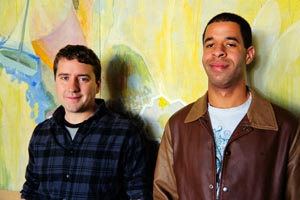Thomas Gelder was working his way through junior college when someone asked if he'd filled out the financial-aid form in his application packet.
Gelder shrugged. The form was long. He figured his parents wouldn't qualify. But the next semester, after he'd finally submitted the form, his college fees dropped from $500 to $45.
"That was my initiation into wanting to educate people about getting into college," says Gelder, now a 26-year-old intensive sociology major at College 10.
Today, Gelder, along with 17 other UC Santa Cruz students, is involved in an undergraduate-led program dubbed UCAN (University & College Access Network). Its aim is to help high school students navigate the sometimes tricky path to college.
Meeting once a week at Soquel High School over a two-month span, UCAN's college mentors last year led 13 juniors through the challenges of filling out college applications and writing personal statements. They helped them chart what courses they needed to meet college requirements. They talked about living with roommates, why it's important to be organized, and how to pick a college that best fits a student's needs. And, of course, they explored the world of fee waivers, grants, scholarships, and loans.
"We're close to their age. We remember how confusing it was to us," says Gelder, now a co-director of UCAN.
"It (a lack of knowledge) is the reason a lot of college-ready students don't even apply," adds Will Brotherson, a 21-year-old sociology major at College Eight who leads the project with Gelder.
Founded two years ago, UCAN is designed to fill in where budget-crunched and overburdened high school counseling programs can't. At Soquel High, for instance, there are only one half-time and two full-time counselors for 1,052 students.
Each 90-minute UCAN session is personalized, with the student-to-mentor ratio no greater than three to one. Students must have GPAs of 2.0 to 3.5 and topics are as simple as whether you have to treat your roommate as a BFF (answer: no) or as complex as whether you need to decide a major the minute you get to college (answer: not necessarily).
"College is a foreign land to a lot of these kids," Gelder says.
Last year, UCAN's mentors helped students who wanted to be police officers, prosecutors, and members of the military. They told them about the need to balance work and play in college, about saving money, about applying for fee waivers, about how personal stories like having to work to support their families meant as much on a college application as a high GPA.
Soquel High Assistant Principal Gail Atlansky (Porter '06, sociology) says she saw the high school students bond with their college mentors, so much so that some of them would hang around to talk after the sessions were finished. Some even kept in touch with their mentors through the summer.
"It's a fabulous program," she says.
UCAN is still a work in progress, say Gelder and Brotherson, but they want it to remain student-led — although not necessarily student-funded. Last year, the $200 cost of the program came out of mentors' own pockets. This year, the program received a grant from the Student Volunteer Center.
The project joins three other UCSC student programs designed to help teens get into college: Destination Higher Education, A Step Forward, and Oportunidades Rumbo a la Educacion.
For Brotherson, the work is a way to put what he has learned in college into practice and fill an internal desire to serve the community.
"It's just a really great experience," he says.
To learn more, visit the UCAN site.



